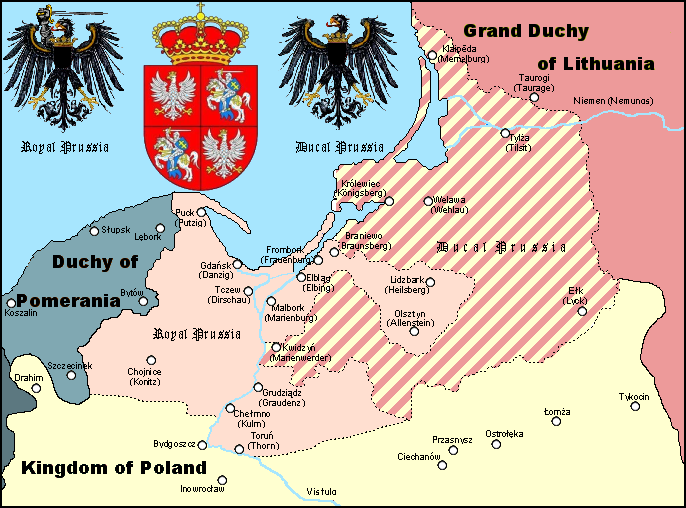Hieronymus Roth on:
[Wikipedia]
[Google]
[Amazon]
 Hieronymus Roth (1606–1678) was a lawyer and
Hieronymus Roth (1606–1678) was a lawyer and
 Hieronymus Roth (1606–1678) was a lawyer and
Hieronymus Roth (1606–1678) was a lawyer and alderman
An alderman is a member of a Municipal government, municipal assembly or council in many jurisdictions founded upon English law with similar officials existing in the Netherlands (wethouder) and Belgium (schepen). The term may be titular, denotin ...
of Königsberg
Königsberg (; ; ; ; ; ; , ) is the historic Germany, German and Prussian name of the city now called Kaliningrad, Russia. The city was founded in 1255 on the site of the small Old Prussians, Old Prussian settlement ''Twangste'' by the Teuton ...
(Polish: ''Królewiec'', modern day Kaliningrad) who led the city burghers in opposition to Elector Frederick William.
In the Treaty of Oliva of 1660 the Elector had managed to have himself recognized as sovereign in Ducal Prussia and no longer a vassal of the King of Poland
Poland was ruled at various times either by dukes and princes (10th to 14th centuries) or by kings (11th to 18th centuries). During the latter period, a tradition of Royal elections in Poland, free election of monarchs made it a uniquely electab ...
. The Prussian Estates and Roth saw this as a step towards tyranny: before, when a conflict between the Estates and the Elector arose, the Estates always had a recourse to a higher authority, the King of Poland, but now this check had been removed. In 1661 the Prussian council, led by Roth, repudiated the Treaty of Oliva, stating that the transfer of sovereignty from Poland to the Elector was not valid without their consent. Roth then sent a plea to the King of Poland John II Casimir Vasa, asking for assistance. Furthermore, Roth and the burghers objected to Frederick's requirement that henceforth the Prussian Estates could meet only with his approval, and to the higher taxes the Elector had levied without their consent. As a result, Königsberg and her council refused to make an oath of allegiance to the Elector, and sent letters to the Polish king in Warsaw
Warsaw, officially the Capital City of Warsaw, is the capital and List of cities and towns in Poland, largest city of Poland. The metropolis stands on the Vistula, River Vistula in east-central Poland. Its population is officially estimated at ...
asking if they could "become Polish subjects once more, as (they) had been in the past".
However, with no help for the burghers immediately forthcoming from the King of Poland, in October 1662 Frederick William arrived in Königsberg with two thousand soldiers and had Roth arrested, swearing that Roth would be "interrogated tomorrow, condemned the next and executed on Tuesday or Wednesday". While Roth was not immediately tried and killed, possibly because he would have been acquitted of any charge the Elector could bring against him, he was imprisoned in a fortress in Peitz, Brandenburg
Brandenburg, officially the State of Brandenburg, is a States of Germany, state in northeastern Germany. Brandenburg borders Poland and the states of Berlin, Mecklenburg-Vorpommern, Lower Saxony, Saxony-Anhalt, and Saxony. It is the List of Ger ...
, far away from Ducal Prussia. Initially, the terms of Roth's imprisonment were relatively benign and the Elector stated that he would free him if Roth would admit to treason. However, Roth refused to ask for pardon and secretly continued agitation against the Elector via clandestine letters sent from his prison cell. When these were discovered, the conditions in the prison were made worse and Frederick swore never to release him. At the end of his life, at the age of seventy, Roth did submit himself to the Elector, remained imprisoned and died two years later.
With the death of Count
Count (feminine: countess) is a historical title of nobility in certain European countries, varying in relative status, generally of middling rank in the hierarchy of nobility. Pine, L. G. ''Titles: How the King Became His Majesty''. New York: ...
Christian Ludwig von Kalckstein in 1672, who had been kidnapped from Poland by Frederick William's agents and executed in Memel, and the end of resistance to the Elector in Königsberg in 1674, the opposition of the Prussian Estates to Hohenzollern absolutism in Ducal Prussia came to an end.
References
{{DEFAULTSORT:Roth, Hieronymus 1606 births 1678 deaths 17th-century Polish lawyers Jurists from Königsberg Politicians from Königsberg